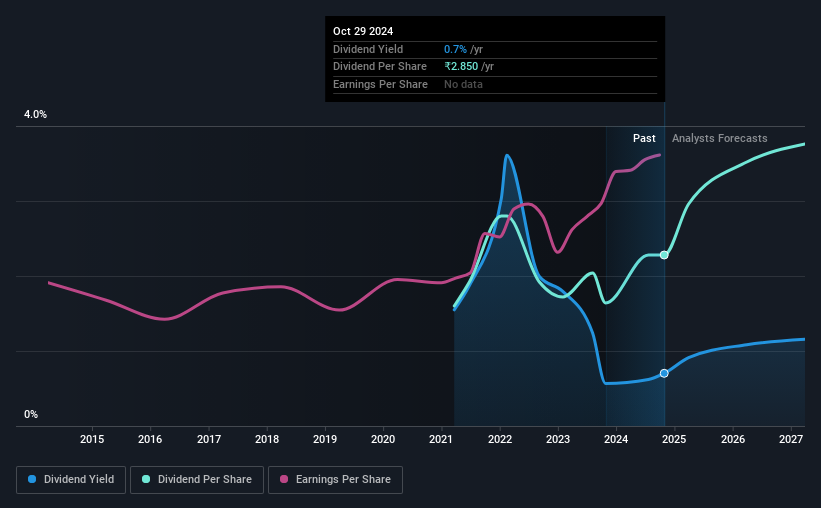- India
- /
- Telecom Services and Carriers
- /
- NSEI:RAILTEL
RailTel Corporation of India (NSE:RAILTEL) Is Paying Out A Dividend Of ₹1.00

RailTel Corporation of India Limited (NSE:RAILTEL) has announced that it will pay a dividend of ₹1.00 per share on the 27th of November. This payment means the dividend yield will be 0.7%, which is below the average for the industry.
See our latest analysis for RailTel Corporation of India
RailTel Corporation of India's Future Dividend Projections Appear Well Covered By Earnings
The dividend yield is a little bit low, but sustainability of the payments is also an important part of evaluating an income stock. Prior to this announcement, RailTel Corporation of India's dividend was only 35% of earnings, however it was paying out 104% of free cash flows. A cash payout ratio this high could put the dividend under pressure and force the company to reduce it in the future if it were to run into tough times.
Looking forward, earnings per share is forecast to rise by 78.2% over the next year. Assuming the dividend continues along recent trends, we think the payout ratio could be 21% by next year, which is in a pretty sustainable range.

RailTel Corporation of India's Dividend Has Lacked Consistency
The track record isn't the longest, but we are already seeing a bit of instability in the payments. Since 2020, the annual payment back then was ₹2.00, compared to the most recent full-year payment of ₹2.85. This implies that the company grew its distributions at a yearly rate of about 9.3% over that duration. We like to see dividends have grown at a reasonable rate, but with at least one substantial cut in the payments, we're not certain this dividend stock would be ideal for someone intending to live on the income.
The Dividend Looks Likely To Grow
With a relatively unstable dividend, it's even more important to see if earnings per share is growing. It's encouraging to see that RailTel Corporation of India has been growing its earnings per share at 13% a year over the past five years. A low payout ratio and decent growth suggests that the company is reinvesting well, and it also has plenty of room to increase the dividend over time.
Our Thoughts On RailTel Corporation of India's Dividend
Overall, it's nice to see a consistent dividend payment, but we think that longer term, the current level of payment might be unsustainable. While the low payout ratio is a redeeming feature, this is offset by the minimal cash to cover the payments. Overall, we don't think this company has the makings of a good income stock.
It's important to note that companies having a consistent dividend policy will generate greater investor confidence than those having an erratic one. Meanwhile, despite the importance of dividend payments, they are not the only factors our readers should know when assessing a company. For instance, we've picked out 1 warning sign for RailTel Corporation of India that investors should take into consideration. Is RailTel Corporation of India not quite the opportunity you were looking for? Why not check out our selection of top dividend stocks.
New: AI Stock Screener & Alerts
Our new AI Stock Screener scans the market every day to uncover opportunities.
• Dividend Powerhouses (3%+ Yield)
• Undervalued Small Caps with Insider Buying
• High growth Tech and AI Companies
Or build your own from over 50 metrics.
Have feedback on this article? Concerned about the content? Get in touch with us directly. Alternatively, email editorial-team (at) simplywallst.com.
This article by Simply Wall St is general in nature. We provide commentary based on historical data and analyst forecasts only using an unbiased methodology and our articles are not intended to be financial advice. It does not constitute a recommendation to buy or sell any stock, and does not take account of your objectives, or your financial situation. We aim to bring you long-term focused analysis driven by fundamental data. Note that our analysis may not factor in the latest price-sensitive company announcements or qualitative material. Simply Wall St has no position in any stocks mentioned.
About NSEI:RAILTEL
RailTel Corporation of India
Provides broadband telecom and multimedia networks and services in India and internationally.
Flawless balance sheet with reasonable growth potential.
Similar Companies
Market Insights
Community Narratives



